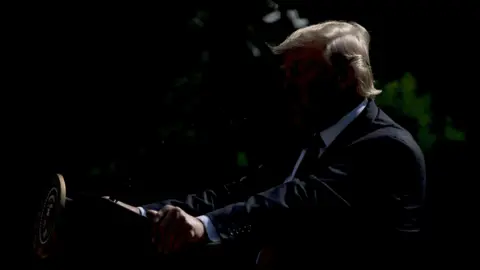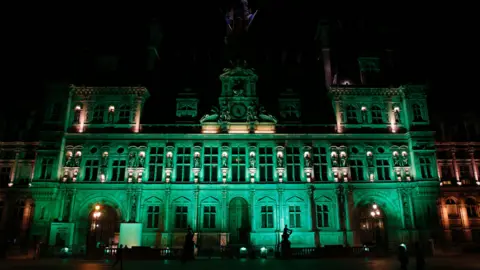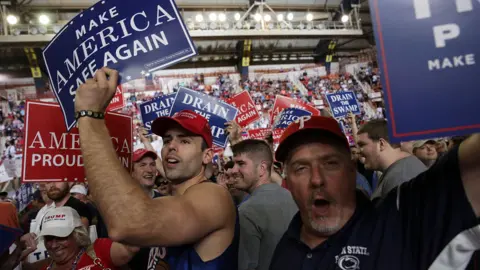Will Paris pull-out hurt Trump?
 AFP
AFPIn the end the collected pressure from environmentalists, diplomats, major US corporations, foreign leaders, Mitt Romney, Leonardo Di Caprio and Ivanka Trump wasn't enough. The US is charting its own course, leaving the international community to fend for itself.
The implications for that community, and the role of US leadership in it, will be the subject of considerable discussion in the days ahead. This decision was not made with international affairs in mind, however. It was one of domestic politics, pure and simple.
If anything, the international community was the foil against which the president made a show of his dedication to the American people - putting Pittsburgh over Paris, as he phrased it.
"The Paris Agreement handicaps the United States economy in order to win praise from the very foreign capitals and global activists that have long sought to gain wealth at our country's expense," he said. "They don't put America first. I do, and I always will."
Donald Trump campaigned on the economy, jobs and deregulation first and foremost. While he's had more than a few tweets and asides about climate change over the years - the "Chinese hoax" quote being the most publicised of the bunch - environmental issues hardly came up over the course of the campaign, either in debates or on the stump.
On a sun-drenched Thursday afternoon in the White House Rose Garden, it was more of the same. Despite a few throw-away lines about clean air and loving the environment, the president's speech was all about jobs and the economy; the "unfairness" of the agreement and the US as the object of international derision.
Traditionally, environmental issues have tended to rise in importance in the US during good times and taken a back seat when voters are more concerned about their economic livelihood.
According to Gallup polling, 40% of Americans worried a "great deal" about climate change in 2000, dropping to 26% in 2004 after the 9/11 attacks and the dot com recession. Concern peaked again at 41% in 2007, before collapsing to 25% in the wake of the Great Recession.
Now the issue is on the rise again, reaching a record high of 45% in March, up 8 points from the same time last year.
Some of this can be attributed to the anti-Trump phenomenon, where the president's position drives near universal opposition from those who hold him in low esteem. The dynamic played itself out earlier this year on healthcare, where the Obamacare reforms reached net-positive levels of approval for the first time shortly after Republicans began efforts to pass repeal legislation.
 Getty Images
Getty ImagesThe question now is whether global warming and environmental issues will have political legs. Activists will certainly be motivated to unseat Mr Trump and his fellow Republicans - including some of the Bernie-or-bust voters and Green Party supporters who turned their backs on Democrats last autumn.
Because of the way the Paris agreement withdrawal is structured, the process won't be complete until just weeks after the 2020 presidential election, virtually guaranteeing the issue will come up in the campaign in some fashion.

Read more

Whether it hurts Mr Trump and his party will have little to do with the amount of scorn he receives from the international community or degraded US influence on the world stage, and considerably more to do with the state of the US economy over the next few years.
Are coal-country jobs coming back? Given the underlying economic fundamentals of the US energy sector, that seems unlikely, despite the president's boast of a new mine opening up soon in Pennsylvania (resulting in only about 70 new jobs).
During his White House speech, Mr Trump predicted that the US economy would grow in the range of 3% to 4% in the coming years - an ambitious mark that, if realised, would put him well on the way to re-election.
Come in under that mark, however, and the president will have to campaign on jobs not lost and economic growth not thwarted. If working-class Americans continue to struggle, that will be as hard a sell for him as it was for Democrats when they held power the last eight years.
 Getty Images
Getty ImagesThen there's history's judgement to consider. Decades from now, Americans could look back and see 1 June 2017 as a missed opportunity, when the US had a chance to address an impending environmental disaster and shrugged. If that's the case, there will be one party - and one president - to blame.
Or, if Republicans are right and the dire climate warnings are overblown, the date will be nothing more than a historical footnote.
In the near term and long, Mr Trump and Republicans are playing political roulette, betting against the rest of the world and half of their own nation. The price for being in the wrong spot when the wheel stops spinning will be high.

